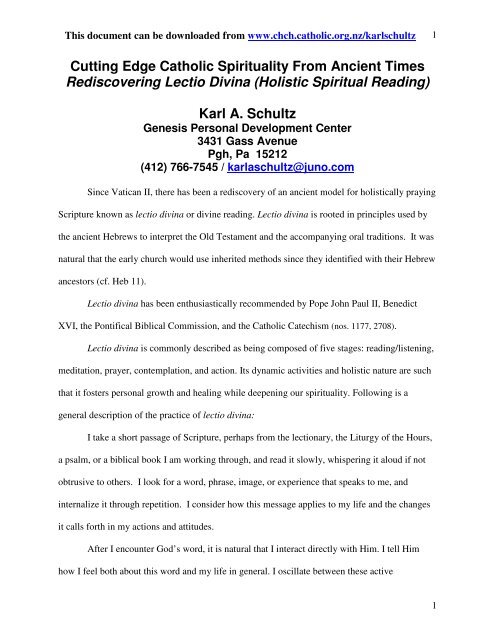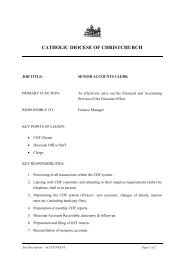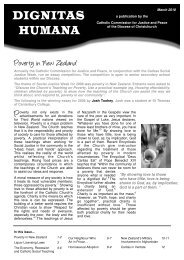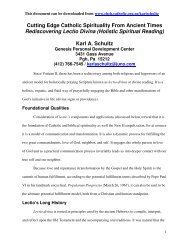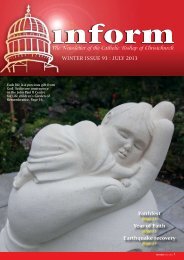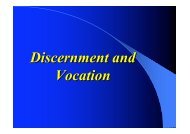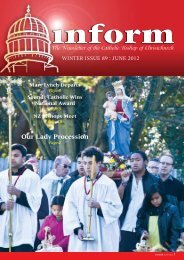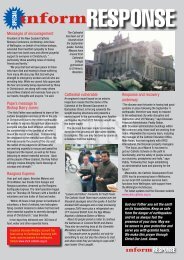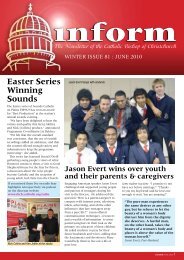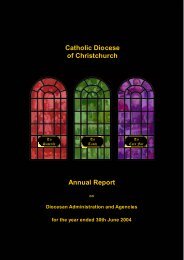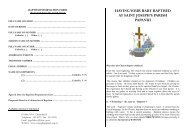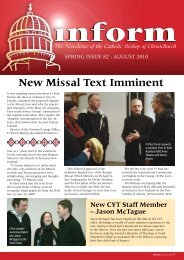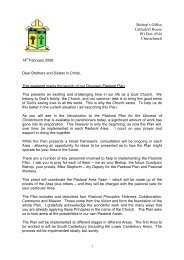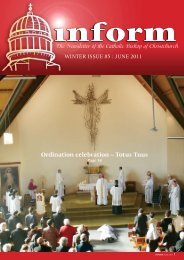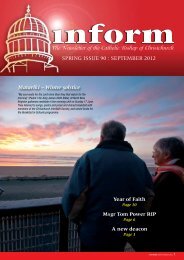Lectio Divina - Summary.pdf
Lectio Divina - Summary.pdf
Lectio Divina - Summary.pdf
Create successful ePaper yourself
Turn your PDF publications into a flip-book with our unique Google optimized e-Paper software.
This document can be downloaded from www.chch.catholic.org.nz/karlschultz 1<br />
Cutting Edge Catholic Spirituality From Ancient Times<br />
Rediscovering <strong>Lectio</strong> <strong>Divina</strong> (Holistic Spiritual Reading)<br />
Karl A. Schultz<br />
Genesis Personal Development Center<br />
3431 Gass Avenue<br />
Pgh, Pa 15212<br />
(412) 766-7545 / karlaschultz@juno.com<br />
Since Vatican II, there has been a rediscovery of an ancient model for holistically praying<br />
Scripture known as lectio divina or divine reading. <strong>Lectio</strong> divina is rooted in principles used by<br />
the ancient Hebrews to interpret the Old Testament and the accompanying oral traditions. It was<br />
natural that the early church would use inherited methods since they identified with their Hebrew<br />
ancestors (cf. Heb 11).<br />
<strong>Lectio</strong> divina has been enthusiastically recommended by Pope John Paul II, Benedict<br />
XVI, the Pontifical Biblical Commission, and the Catholic Catechism (nos. 1177, 2708).<br />
<strong>Lectio</strong> divina is commonly described as being composed of five stages: reading/listening,<br />
meditation, prayer, contemplation, and action. Its dynamic activities and holistic nature are such<br />
that it fosters personal growth and healing while deepening our spirituality. Following is a<br />
general description of the practice of lectio divina:<br />
I take a short passage of Scripture, perhaps from the lectionary, the Liturgy of the Hours,<br />
a psalm, or a biblical book I am working through, and read it slowly, whispering it aloud if not<br />
obtrusive to others. I look for a word, phrase, image, or experience that speaks to me, and<br />
internalize it through repetition. I consider how this message applies to my life and the changes<br />
it calls forth in my actions and attitudes.<br />
After I encounter God’s word, it is natural that I interact directly with Him. I tell Him<br />
how I feel both about this word and my life in general. I oscillate between these active<br />
1
This document can be downloaded from www.chch.catholic.org.nz/karlschultz 2<br />
communications and a receptive or listening mode, where I am simply present to God. I ask the<br />
Holy Spirit to open my heart and mind to His presence and activity in my life. To dispose myself<br />
to a greater internalization of God’s gifts, I linger with Him as I would an intimate friend. To<br />
soothe my irritations and anxieties, I dispose myself to God's consolation, the indescribable<br />
peace mentioned by Paul (cf. Phil 4:7).<br />
To make a transition from prayer to action, I make a gentle resolution to apply what I<br />
received in lectio divina into practice. I then close with a prayer, whether in my own words or<br />
from Scripture (e.g., a Hail Mary or Lord’s Prayer, or part or all of a psalm).<br />
For Catholics, God's word is not exclusive to the Bible. It is present pre-eminently in<br />
Jesus (cf. Jn 1:1-18), and is also found in church teaching, tradition, the sacraments, nature, and<br />
human beings, particularly those in pain (cf. Mt 25:31-46). I don't need to wait until my prayer<br />
time to engage in the activities of lectio divina. The following are a sample of daily<br />
opportunities for holistically experiencing God's word: relating openly with another person,<br />
experiencing some aspect of nature, and reflecting or journaling on God's involvement in my<br />
day.<br />
The fundamental attribute of lectio divina is its Spirit-driven nature. There are no rigid<br />
rules or compulsive techniques. Just as human intimacy must be natural and dialogical, so<br />
intimacy with God must flow freely and peacefully. We begin by acknowledging that we do not<br />
know how to pray, and thereby invite the Spirit to intercede for us (cf. Rom 8:26-27.) We<br />
practice trusting God at the controls without abandoning our responsibilities.<br />
People who pray are already practicing some form of lectio divina. Knowledge of its<br />
objectives, components, and flow enables us to avoid sloppiness and complacency and offer<br />
ourselves to God and each other more completely.<br />
2
This document can be downloaded from www.chch.catholic.org.nz/karlschultz 3<br />
Karl A. Schultz is the director of Genesis Personal Development Center in Pittsburgh,<br />
Pennsylvania. He is one of the world’s most prolific speakers and writers on lectio divina. He<br />
has written twelve books on lectio divina and its various applications. His website is<br />
karlaschultz.com, and he can be contacted at karlaschultz@juno.com.<br />
3


